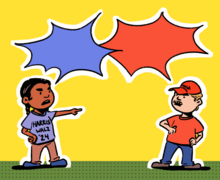Legality of RIAA subpoenas called into question
As the RIAA began carrying the big stick this summer to prevent individuals from downloading ‘Magic Stick,’ many Syracuse University students are concerned about being the next targets.
‘I definitely don’t download songs as often as I used to,’ said Kristin Dunn, a freshman communications and management major. ‘There’s a lot of apprehension in the process. That’s a lot of money.’
The Recording Industry Association of America issued nearly 900 subpoenas to obtain the identities of file sharers who are exchanging ‘substantial amounts of copyrighted music over peer-to-peer networks,’ according to the RIAA press release.
Under the Digital Millennium Copyright Act, Internet service providers must provide copyright holders with the identities of users who download their material, said the RIAA. With this information, the organization will prepare lawsuits totaling thousands of dollars against the individuals.
‘They’re only going after people who are doing this on a large scale,’ said Eugene R. Quinn Jr., a professor at the SU College of Law and founder of IPWatchdog.com, which is a source of information about intellectual property, the Internet and antitrust laws. ‘The likelihood that the RIAA is going to come knocking on your door is virtually nonexistent. One or two songs here or there are not going to hurt, most likely.’
Some students are not concerned with the threat of being sued and will continue to file share as usual, using the same logic as Quinn.
‘With the amount of people who are doing it, and the amount of people who got caught, I don’t think most people will think twice about it,’ said John Sorriento, a freshman music industry major.
Several colleges raised objections to the legality of subpoenas they have received. On July 21, Boston College and the Massachusetts Institute of Technology filed motions challenging the subpoenas in the U.S District Court in Boston.
‘MIT of course has a policy of complying with lawfully imposed subpoenas,’ said James Bruce, vice president of information systems at MIT, in a statement. ‘But in this case we have been advised by counsel that the subpoena was not in compliance with the court rules that apply to these subpoenas, and did not allow MIT time to send any notice [to students] as the law requires.’
Boston University has received one subpoena so far. The university decided that it would not comply with it because it has no legal bearing in Massachusetts, according to Kevin Carleton, assistant vice-president of public relations at BU.
A Washington district court issued the subpoena and the legality of the subpoena extends only within a 100-mile radius from the court, Carleton said. Because Boston is beyond that radius, that court has no legal authority over the university.
‘If a legitimate subpoena comes through, we will comply,’ Carleton said. ‘It’s a matter of complying with the law.’
Carleton added that although student information is protected by privacy laws, a subpoena would take precedence over those laws.
Tracy Mitrano, director of information technology policy and computer law and policy at Cornell University, said that even though Cornell has not received a court subpoena, a memo from the University Council stated that ‘the university has not, however, typically fought students’ battles for them,’ and that if a student’s information is subpoenaed, the university will first notify the student before releasing the information. The student can then object to the release of the information.
‘If no objections are interposed, the university complies with such subpoenas by sending appropriate education records,’ Mitrano said university policy states.
Many people believe that file sharing has not harmed the recording industry but has actually been beneficial by leading to the discovery of new talent within the music industry.
‘It’s an incredible incentive strategy that the industry is beating down with a stick,’ Quinn said. ‘Up to 60 percent of downloaders buy the albums. The problem with the music industry is it has never embraced new technologies.’
Local music stores have not noticed a significant decline in sales as file sharing and burning MP3 files have become more popular.
‘There are still a lot of kids who come and buy albums here,’ said Eric Guercio, a senior history major at SU and floor manager of SoundGarden. ‘I think the file sharing actually helps people get samples. Then they say, ‘hey, I want the whole album.”
Some students believe that people will find ways to obtain music for free as the costs of CDs continue to rise.
‘The stores are so expensive,’ Guercio said. ‘Why buy the new Alien Ant Farm disc for $16.99 when you can get it for free?’
Quinn said that the RIAA is attempting to make individuals fearful of file sharing, a strategy that is nearly as effective as actual legal action.
‘It’s going to happen anyway, they might as well find some other way to handle it,’ Guercio said. ‘College kids have more important things to do than go to court.’
Published on August 28, 2003 at 12:00 pm





